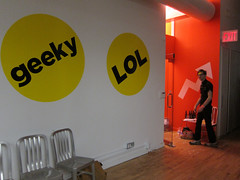I only update this blog occasionally because most of my writing these days appears on other people’s websites. But my blog is still my home base. Here’s a round up of what I’ve been scribbling about elsewhere of later.
Social is the Future of Search (Profitecture Blog)
What could possibly unseat Google as the king of the Web? The answer might be incubating in fast-growing media operations like BuzzFeed (right) and Upworthy. These publishers eschew search optimization in favor of creating content that people want to share. From an SEO perspective, they do a lot of things wrong. And they’re killing it online at the moment.
Marketing’s big miss (BtoB magazine)
A new McKinsey & Co. report reveals a startling disconnect between B2B companies and their customers that should give every marketer pause to reflect on his or her priorities. The research shows that the themes that B2B companies emphasize in their marketing messages are wildly inconsistent with the factors that B2B buyers care about most.
Short on content? Repackage (BtoB magazine)
A lot of marketers are frustrated by the perceived need to turn out a lot of content, but the problem is much more manageable if you reuse and repackage creatively. Here are some ideas for how to get more mileage out of the stuff you already have.
Rewarding Bad Behavior (Godfrey Blog)
Marketing and sales organizations at most B2B companies have a relationship that can be politely described as strained. Sales complains that marketing gives them lousy leads while marketers charge that sales wouldn’t know a good lead is it bit them on the nose.
Both sides are correct. That’s because many organizations reward their sales and marketing people for the wrong things. Improve lead quality and a lot of the bad karma disappears.
Altimeter’s Brian Solis: ‘It’s the Customer Experience, Stupid’ (Huffington Post)
Brian Solis (right) is one of the most consistently provocative and perceptive analysts in the world of new media and social business. I caught up with him shortly before his Pivot conference in October to find out what’s on his mind. He believes few CEOs know how dramatically their businesses will change as a result of customer empowerment. And he thinks any business can enchant its customers. Even one that makes hammers.
Five Important Differences Between Paid and Earned Media (Profitecture Blog)
Many marketers treat social or “earned” media the same way they treat advertising and direct mail, but the two forms of media are very different. Earned media is more valuable because people volunteer to share your information. This benefits small and patient companies disproportionately. If you talk at customers in earned the channels the way you do in paid channels, your results will probably disappoint you.











